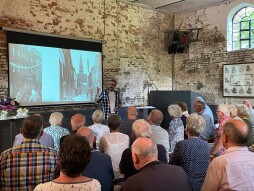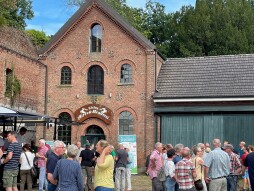
© Stadt Bocholt
Der Vortrag des Bocholter Historikers Dr. Marius Lange zog auf Hof Tangerding viele Besucherinnen und Besucher an.
© Stadt Bocholt
Viele Besucherinnen und Besucher nutzten die Gelegenheit auf dem Hof der ehemaligen "Hirsch-Brauerei" Tangerdings zu einer Verkostung.Lecture on "Bocholt Breweries" attracts many visitors
Event in the context of the Bocholt city anniversary at Hof Tangerding
Bocholt historian Dr. Marius Lange gave an insight into the history of the brewing trade in Bocholt at the weekend in the courtyard of the former Hirsch brewery in Bocholt-Stenern. More than 350 interested people followed the lecture, which was spiced with plenty of anecdotes and which historian Lange gave twice due to the large crowds, and enjoyed a tasting on site. The event was held as part of the 800th anniversary of the city under the theme "City History on Site".
Speaker Lange went into detail about the varied brewery history in Bocholt. "Brewing has always taken place in Bocholt," said Lange. Often, gift innkeepers brewed beer to serve in their own "pub." In addition to such smaller home breweries as the Schenkwirtschaft Wildör in Ravardistraße, founded in 1823, four commercial breweries had developed in 19th-century Bocholt, selling their beer in bottles and kegs.
Joseph Deipenbrock was one of them. A native of Ramsdorf, he came to Bocholt in 1887 to take over a tavern and brewery at Ravardistraße 26. Because Deipenbrock's sons served as soldiers in World War I and "fell," the brewery was discontinued in 1917 for lack of a successor.
The Bocholt brewers like Deipenbrock had to deal with various problems. First, they needed enough ice to cool their beer throughout the year. For this purpose, for example, meadows beyond the Schwanenmühle were put under water. If the water froze into ice, it was "beaten" and stored. The breweries kept their beer cool with ice and immediately supplied the local taverns with it.
Groundwater suitable for brewing beer
In addition to ice, good groundwater quality was important for the breweries. The south of Bocholt seemed predestined for this. After all, the Rhine once ran through the Biemenhorst-Lankern area. The layers of clay left behind by the former riverbed filtered the groundwater so well that it was ideally suited for brewing beer. Thus, around 1870, a brewery was established in Biemenhorst and one in Lankern. The "Waldschlößchen" in Biemenhorst was in operation until 1889/90.
Later it was used as a residential building. A few hundred meters further on, the Amsen brothers from Bocholt opened a brewery in Lankern at the same time. However, the company's headquarters always remained in Bocholt, including when Bernard Langenhoff took over the brewery at the end of the 1880s. He also ran a well-known, middle-class pub at Nordstrasse 10 in Bocholt, which was later continued by his son Heinrich. He was drafted as a soldier in 1915, as was his brewmaster. The Bergbrauerei Langenhoff then ceased operations.
Hirsch-Brauerei Tangerding experiences heyday
Historian Lange also reported on the history of the Stenerner Hirsch-Brauerei Tangerding, which was founded at an unknown time by the landowning family. A surviving brewery building where the lecture took place can probably be dated to 1826. The business must have apparently flourished. For in 1896/97, the generous expansion to a factory steam beer brewery took place. "Hirschbräu", the beer from the largest brewery in Westmünsterland, was drunk in many pubs in Bocholt.
The "Hirsch-Brauerei" produced various types of beer such as Export, Pilsener, Alt and the non-alcoholic and "doctor-recommended" sanitary malt beer. There were also keg sodas and later the "fruli" fruit lemonade, which was popular with children. Beer barrels and bottled beer were transported to the city by horse and cart, where "Tangerdings" was served in many pubs. After the First World War, Tangerding became the only brewery in Westmünsterland.


